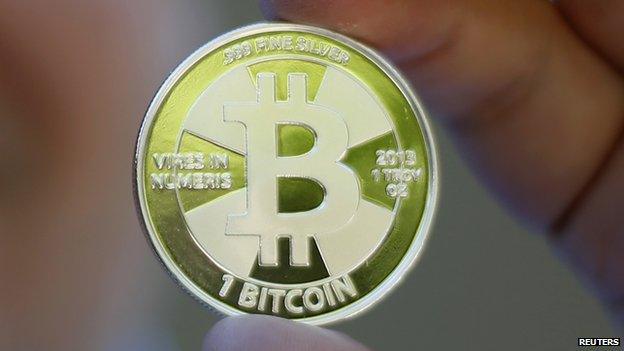Bitcoin could split in debate over currency's future
- Published

Bitcoin miners are in disagreement over which software to use
A row over changing the software that produces bitcoins could split the virtual currency, core developers say.
Bitcoin XT, a new version, is currently being recommended by the currency's chief scientist, Gavin Andresen.
And its developer, Mike Hearn, says its adoption is essential to ensure the currency can cope with growing demand., external
But some, including a large number of bitcoin miners in China, are resisting XT because of how it might affect control over the currency.
Bitcoin's blockchain - a digital ledger of all transactions made with the currency - is currently made up of 1MB blocks.
Bitcoin XT would enable these blocks to grow to 8MB.
But this would mean XT was no longer compatible with existing Bitcoin software, creating, its detractors say, two separate currencies and eroding trust in both.
Mr Hearn told the BBC the Bitcoin community's reaction to the release of the XT software at the weekend had been mixed, but there were some encouraging signs.
"We've gone from zero people running the software to 10% of the network in 72 hours, which is really good," he said
Consensus on consensus
But many are unhappy the core development team at Bitcoin is currently in disagreement over whether Bitcoin XT is right for the future of the currency.
A pool of large Chinese mining groups, for example, have said they will not adopt the software unless it is unanimously adopted by the core team.
Mr Hearn said he had decided to force the issue in order to overcome the stalemate.
"If you look at the guys working on the Bitcoin core, they talk about consensus all the time - but if you ask them what they really mean, they can't tell you," he said.
"There is no consensus about what consensus means."
Mr Hearn acknowledged, however, the reduced control developers had under XT would mean they would have to split the currency a second time if they were unhappy with future decisions.
"If we go off the rails and do things that aren't in the best interests of the community, then the solution is fork it again," he said.
Dr Vili Lehdonvirta, at the Oxford Internet Institute, said the adoption of Bitcoin XT would mean "the community has much fewer guarantees of being listened to".
"Those algorithms are made by humans and whoever writes them gets to have power over the system," he told the BBC.
Dr Lehdonvirta added increasing block size could potentially make Bitcoin less accessible.
"Downloading the whole blockchain is already such an effort that most people choose not to run Bitcoin on their computers," he said.
"This would put Bitcoin on a trajectory where that problem is exaggerated."
- Published20 May 2015

- Published24 April 2015

- Published24 April 2015

- Published11 June 2015
